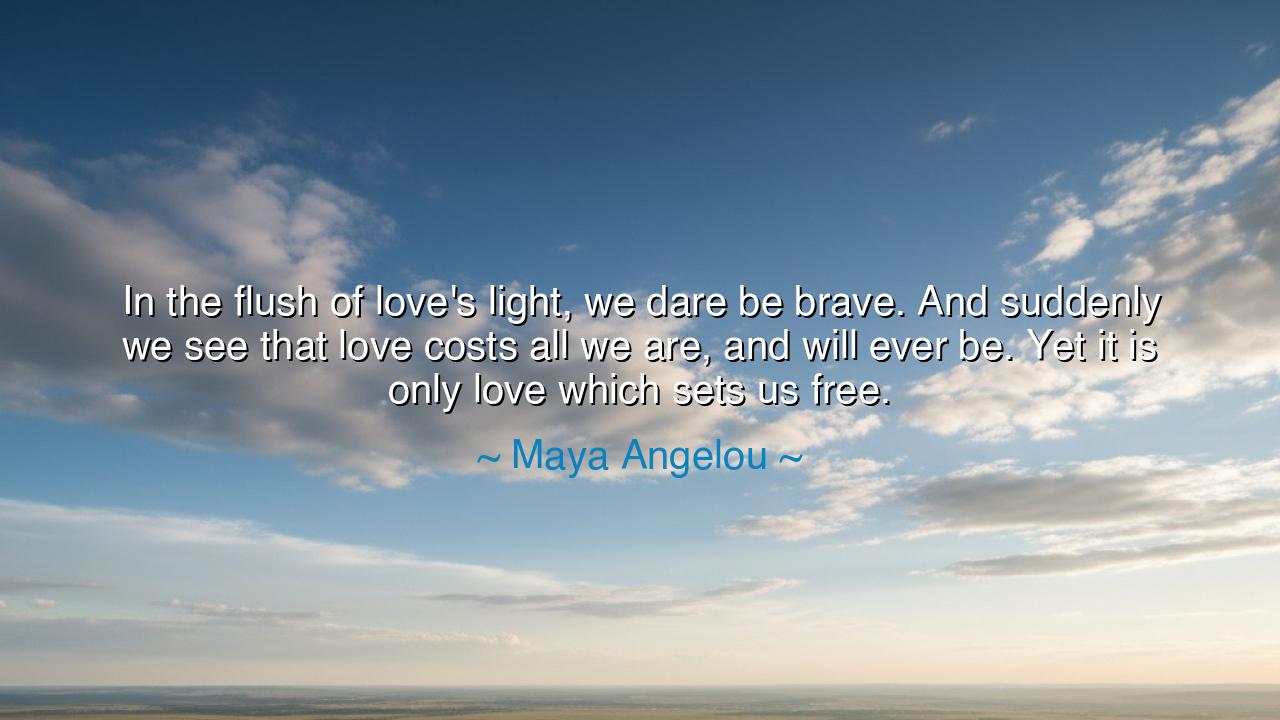
In the flush of love's light, we dare be brave. And suddenly we
In the flush of love's light, we dare be brave. And suddenly we see that love costs all we are, and will ever be. Yet it is only love which sets us free.






"In the flush of love's light, we dare be brave. And suddenly we see that love costs all we are, and will ever be. Yet it is only love which sets us free." These profound words from Maya Angelou capture the transformative and often paradoxical nature of love. In the brilliance of its light, love gives us the courage to face the unknown, to act with boldness and passion, as if we are invincible. But Angelou also speaks of the cost of love, the price that must be paid to fully embrace it — the surrender of our selves, the giving of all that we are. And yet, despite the sacrifice, love frees us in a way that nothing else can. It liberates us from fear, from doubt, and from the boundaries we place upon our own hearts. To love fully is to become both vulnerable and empowered — to be willing to lose everything for the sake of something that gives us everything in return.
The ancients understood the dual nature of love — its beauty and its pain. In Greek philosophy, love was seen as a powerful force that could both elevate and destroy. Socrates, in his dialogues, described love as a divine madness, a state of being where one is moved beyond the ordinary, beyond self-interest, and toward a greater understanding of truth and goodness. This divine madness, though it often led to great personal sacrifice, was ultimately a path to freedom. To love, in this sense, was not a simple or easy act; it demanded the whole self. It was through love that the soul was freed, not by holding on to safety, but by giving oneself entirely. Angelou echoes this ancient wisdom, reminding us that love asks for everything, but in return, it offers us the freedom to be our most authentic selves.
In the tales of Greek mythology, love’s cost is shown again and again. Orpheus, the great musician, loved his wife Eurydice so deeply that he descended into the underworld to bring her back. Yet, in the end, the price of love was too great. Orpheus, unable to resist the temptation to look back at Eurydice before they had reached the surface, lost her forever. His love demanded all — his courage, his sacrifice, and ultimately, his heart. Yet it was in the depth of his love that Orpheus found a kind of freedom: the ability to transcend life and death, to give everything for a fleeting chance at reunion. This myth serves as a reminder that the freedom love grants is not always free of pain; it is, instead, a journey marked by loss, longing, and, ultimately, transformation.
Consider the historical example of Antony and Cleopatra, whose love led to both great glory and great ruin. Their relationship, born from a union of political power and personal affection, demanded everything from them — from Antony’s reputation to Cleopatra’s kingdom. In their final moments, when they faced defeat, both chose death over the loss of the love that had consumed them. Their love cost them their lives, yet in the grand narrative, it is remembered not just for its tragedy, but for the freedom it gave them to choose a path of passion and devotion. Their love was a force that defied empire and dynasty, a reminder that love can free us from even the most powerful of earthly concerns.
In our modern world, love still asks for sacrifice — perhaps not in the form of life or kingdom, but in the quiet ways we give of ourselves to others. Love asks for vulnerability, the courage to show our true selves, to give without expecting something in return, and to endure the uncertainty of opening our hearts to others. It is in these moments of selflessness, when we risk the discomfort of loving fully, that we experience the freedom Angelou speaks of. True love, the kind that gives us strength and peace, comes when we let go of our fear and allow ourselves to be fully present with another.
The lesson here, as Maya Angelou teaches us, is that love is not a simple or convenient emotion. It asks everything from us — our time, our energy, and our hearts. It may be terrifying to give so much of ourselves, to allow vulnerability to take root in the very core of our being. But in that vulnerability, we find the freedom to be who we truly are. To love fully is to be both brave and free. It is to open our hearts without reservation, knowing that the act of loving will transform us and, perhaps, change the world around us.
Therefore, my children, let love be your guide and your strength. Know that love will ask much of you — it will require your courage, your sacrifice, and your trust. But in loving, you will find the freedom to be your most authentic self. Do not shy away from love because it asks for everything; embrace it for the very freedom it offers in return. Love, in its purest form, is the force that will set you free, that will bring you closer to your true essence, and allow you to live without the burden of fear or doubt. Love is the journey, the sacrifice, and the freedom that awaits those who are brave enough to walk its path.






AAdministratorAdministrator
Welcome, honored guests. Please leave a comment, we will respond soon